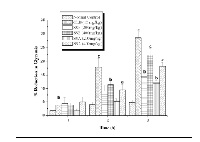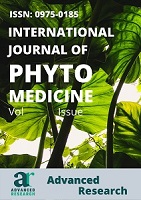Hypoglycemic activity of Sida spinosa Linn. root extract in normoglycemic rats
Keywords:
Diabetes mellitus, Hyperglycemia, OGTT, Serum glucose, Sida spinosaAbstract
There is an increased demand of patients to use natural products with antidiabetic activity and ethnobotonical survey conducted revealed that Sida spinosa Linn. root is used in the treatment of diabetes. The present investigation aims to examine the hypoglycemic potential of Sida spinosa Linn. root in normal rats. The root of Sida spinosa Linn. was extracted using ethanol and water and tested for acute toxicity according to OECD 423 guidelines. The ethanolic (SSE) and aqueous (SSA) extracts at 200 and 400 mg/kg b.w. were screened for blood glucose lowering capacity in normal animals (18h fasted rat model) and Glibenclamide (GLB) was used as a standard. Serum glucose (SG) levels were estimated using a glucose oxidaseperoxidase reactive strips and a glucometer. The oral glucose tolerance test (OGTT) was carried out in normal rats. The results of acute toxicity showed that the animals had good tolerance to single doses of SSE/SSA in doses as high as 4000mg/kg and were non-lethal. In OGT test, the normoglycemic rats treated with higher dose SSE, SSA and GLB (10mg/kg) showed 30.36%, 25.24% and 33.21% reduction (P<0.001) in SG level respectively over the period of 120 min compared to normal control group. In single dose one day study, higher dose of SSE, SSA and GLB showed significant (p<0.001) reduction in SG levels (22.3%, 18.2% & 28.6% respectively) at 3h after oral administration. The ethanolic extract (400 mg/kg) was more effective in reducing the SG level in OGTT compared to aqueous extract with improved glucose tolerance. The root of Sida spinosa Linn. has potent hypoglycemic activity in normal rats justifying its use in indigenous system of medicine.
References
. Ronald KC, Gordon WC, George KL, Alan
JM, Alan MC, Smith R. Joslin’s Diabetes
Mellitus. 13th ed. B.I. Waverly Pvt. Ltd 1994,
New Delhi, pp.193-265.
. Geoffey VG, Pickup JC. William’s “Text
Book of Diabetes.” Blackwell Scientific
Publications, 1991. 2nd ed. pp. 37-44.
. Gerich JE. Clinical significance: pathogenesis
and management of postprandial
hyperglycemia. Archives of Internal Medicine
;163(11):1306-1316.
. Kecskemeti V, Bagi Z, Pacher P, Posa I,
Kocsis E, Koltai MZ. New trends in the
development of oral antidiabetic drugs. Current
Medicinal Chemistry 2002;9(1):53-71.
. Schuster DP, Duvuuri V. Diabetes mellitus.
Clinics in Pediatric Medicine and Surgery
;19(1):79-107.
. Palsamy P, Subramanian S. Resveratrol, a
natural phytoalexin, normalizes hyperglycemia
in streptozotocin-nicotinamide induced
experimental diabetic rats. Biomedicine &
Pharmacotherapy 2008;62:598-605.
. Venkatesh S, Reddy GD, Reddy BM, Ramesh
M, Rao AV. Antihyperglycemic activity of
Carulluma attenuata. Filoterapia
;74(3):274-279.
. Khare CP. Indian Medicinal Plants an
Illustrated dictionary. New York: Springer;
p. 605.
. OECD (2002), Test No. 423: Acute Oral
toxicity - Acute Toxic Class Method, OECD
Guidelines for the Testing of Chemicals,
Section 4: Health Effects, OECD Publishing.
. Shirwaikar A, Rajendran K. Effect of aqueous
bark extract of Garuga pinnata roxb. in
Streptozotocin-nicotinamide induced type-II
diabetes mellitus. J Ethnopharmacol
;112:1-6.
. Sah SP, Sah ML, Juyal V, Pandey S.
Hypoglycemic activity of aqueous extract of
Urtica parviflora roxb. in normoglycemic rats.
Int J Phytomedicine 2010;2:47-51.
. Nadkarni KM, Nadkarni AK. Indian Materia
Medica. Bombay: Popular Prakashan; 1976. p.
-6. (vol 1)
. Prince PSM, Menon VP. Hypoglycemic and
other related action of Tinospora codifolia roots
in alloxan rats. J. Ethnopharmacol 2000;70:19-
. Davis SN, Granner DK. Insulin, Oral
Hypoglycemic Agents and the Pharmacology of
the Endocrine Pancreas. In: The
Pharmacological Basis of Therapeutics,
Goodman, L.S. and A.G. Gilman (Eds.); 1996.,
th Edn., McMillan Publishers, New York.
. Andrew JK. Diabetes. Churchill Living Stone
, New York.



